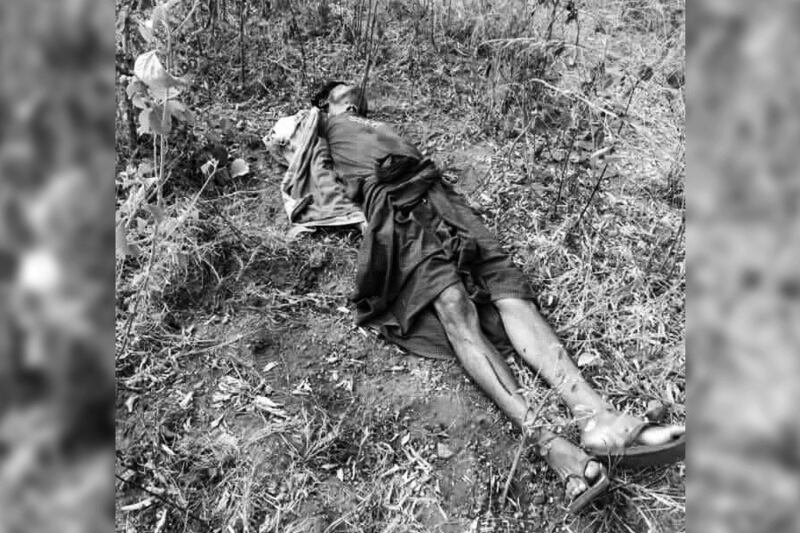Residents in central Myanmar made a grisly discovery on Wednesday when they stumbled upon the corpses of six civilians who worked at a local motorbike repair shop.
Their bodies bore signs of torture and their hands had been tied behind their backs, apparently executed by junta troops.
“It appeared as if [the soldiers] struck their necks with a sword. We found that their throats were cut,” said a resident of Ywar Thit village in the Mandalay region who was among those that found the bodies. He spoke to Radio Free Asia on condition of anonymity, citing fear of reprisal by the military.
Photos provided to RFA of the bodies appeared to confirm the source’s description. All six of the men’s hands are bound and their throats are slit.
Three of the men have wounds to their throats that suggest they were made with a heavy weapon, such as a machete, while a fourth has a similar wound on the top-left of his head that has penetrated his skull. The heads of two of the men appear to have been crushed, while the chests of two others show as many as eight stab wounds.
No political affiliation
The source said two of the bodies were found between Myingyan’s Thar Paung and Gaung Kwe villages, another two near the intersection of Thin Pyun Road on the outskirts of Natogyi township, and the last two just west of Natogyi’s Ywar Gyi village.

“The cuts of the bodies found west of Ywar Gyi village and those near Thar Paung village were exactly the same,” he said. “It appeared to me that the junta soldiers made them kneel, tied their hands behind their backs, and delivered a blow to their necks when they were tired of torturing them.”
The victims were “innocent civilians” who were employed by a local motorbike repair shop, said a resident of Ywar Thit village, who also declined to be named.
“[They] were just simple villagers who weren’t involved in any political activities,” he said. “They weren’t members of any political parties or organizations … But the pro-military Pyu Saw Htee militia and junta troops arrested and cruelly killed them.”
The junta has yet to release any information about the killings of the six men. Attempts by RFA to contact the junta’s spokesman for Mandalay region, Thien Htay, went unanswered on Thursday.
Sources from the two townships identified the six dead as Min Thu and Kaung Kaung, both 20; Aung Than Kyaw and Zayar Phyo, both 30; and Aung Naing Win and Zaw Naing Win, both 43.
Inflicting terror
Residents said that the discovery of the bodies followed a Nov. 29 raid on Ywar Thit village in which junta troops from the No. 88 Light Infantry Division and members of the pro-military Pyu Saw Htee militia detained six civilians.
The families of the deceased retrieved their bodies on Wednesday from the Myingyan township mortuary and buried them in the township’s Su Phyu Kone cemetery, residents told RFA. Due to the graphic nature of their deaths, family members were unable to inspect the bodies of the victims and confirm their identities, they said.
A political activist in Myingyan township, who gave his surname as Soe, told RFA that the junta hopes to gain control of the region through fear by arresting and killing innocent civilians.
“When they lose their military bases and informers [to anti-junta forces], or suffer losses in battles, they attack unarmed civilians as revenge, since they cannot crush the resistance,” he said.
“Myingyan-based junta troops and the … pro-junta militia try to cow the people by torturing and killing innocent civilians they accuse of being supporters of the [deposed National League for Democracy] NLD party and [anti-junta] People’s Defense Forces [paramilitaries],” he said.
“In fact, as they cannot crush the armed resistance, they are abducting and killing innocent and unarmed civilians who become caught in the middle.”
According to Thailand’s Assistance Association for Political Prisoners (Burma), junta troops have killed at least 2,604 civilians and arrested more than 16,500 others in the 22 months since the Feb. 1, 2021 military coup, mostly during peaceful anti-junta demonstrations.
Translated by Myo Min Aung. Written in English by Josh Lipes. Edited by Malcolm Foster.
